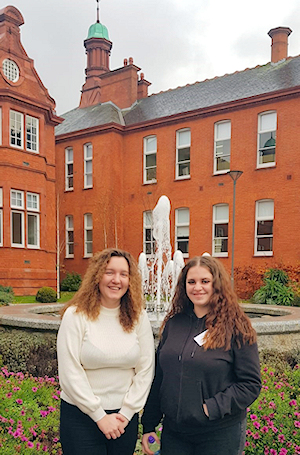Peer Researchers attend homelessness conference in Ireland
Posted on 27 November 2019
Jade Ward from University of York Department of Social Policy and Social Work’s Social Policy Research Unit and two peer pesearchers, Amy and Tia, were invited by Focus Ireland to share their experience of how Peer Research works within the evaluations of children’s social care currently being conducted by the Child Welfare Research Group (CWRG). The CWRG is currently carrying out evaluations of innovative projects that aim to provide positive and long-term housing solutions for care experienced young people including The House Project and Break Staying Close.
Peer research is designed and delivered by all involved in the subject area, this includes professional researchers and/or organisations as well as service users or individuals with life experience of the subject area. Peer research has the power to create new knowledge, to challenge dominant discourses, and to provide real benefits to peer researchers and the research. This approach underpins the research carried out by the CWRG.
The conference provided an opportunity to learn about the innovative research conducted through organisations working to end homelessness, both in Ireland and in other European countries. Some of the key discussions throughout the day focused on some of the methodological issues arising with this type of research, most particularly in relation to ethics, validity and tokenism.

Peer Researchers, Amy and Tia
Jade, Amy and Tia shared learning and experiences throughout the day via a presentation and table discussions, and Amy took part in the panel discussion at the end of the conference. Amy said: "The conference was an exciting and rejuvenating event in which those that worked in the field of social research and on the frontline tackling some of the world’s most pressing social issues came together to share how they have implemented peer research within their respective fields. Discussions included some of the major implications of using peer research, trying to create a more standardised definition of what peer research is, as well as how it can benefit both peer researchers and research teams alike."
Tia said: "I was very nervous when presenting our presentation. Presenting in front of experienced and professional researchers was intimidating considering I’ve only been a peer researcher for only four or so months. I was fully supported throughout the day which was comforting and I definitely have more knowledge on peer research now."
In regards to the peer research methodology, Amy commented that "having the ability to share the incredible way that the University of York is using peer research and knowing that what we disseminated at the conference has the potential to shape the way that peer research is used globally. I learnt that scope for using peer research is much more widespread than just training care leavers to be peer researchers. It was interesting to see how it was used with regards to homelessness, how the vast sampling age range within homelessness was used to match up peer researchers to interviewees so that participants cannot just relate to each other through their shared experience but also through age."
Tia added: "I have learned that peer researchers themselves are very passionate about what they do because all are doing it from experience, and that peer researchers don’t always get the acknowledgement they deserve. I also learned that peer research gives added quality to dissemination."
Following on from the conference, Jade will be contributing to the discussion on peer research with some of the key services at the event.
Notes to editors:
Research carried out by the CWRG and by leading charities, such as Centrepoint, suggests that at least one in four care leavers experience a period of homelessness after leaving care.
